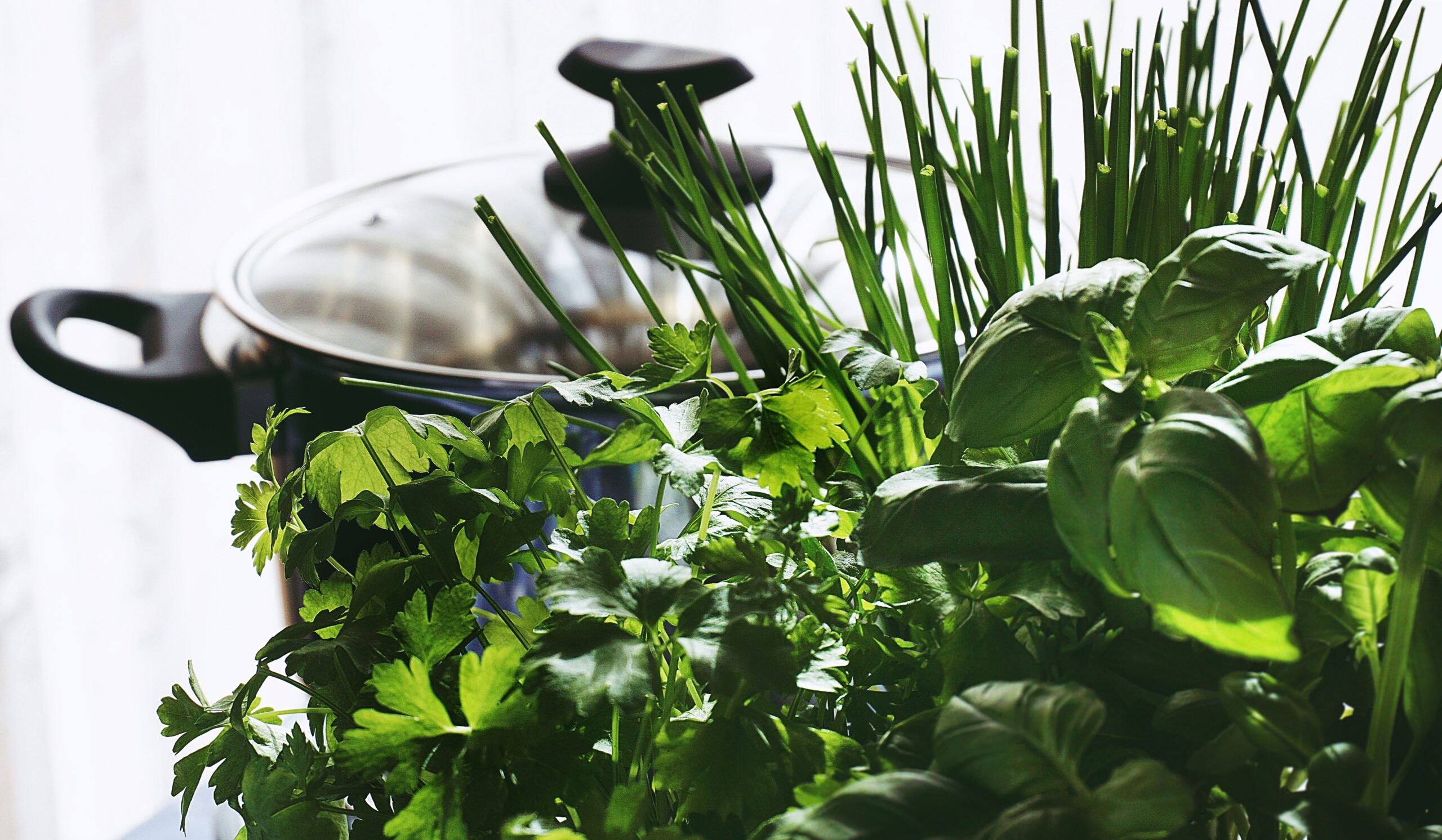As a dog owner, there’s nothing quite like the joy of sharing your life with a furry friend. They bring love, laughter, and a fair share of mischief into our homes. Part of keeping them safe and happy involves knowing what’s good and bad for them to consume. One topic that often surprises many pet owners is the potential toxicity of certain herbs to dogs.
You might be thinking, “Herbs? Really?” Yes, really! While we humans use herbs to add flavor to our meals or for their medicinal properties, some of these common household items can pose serious health risks to our canine companions.
In this article, we will delve into the details of what herbs are toxic to dogs, why they’re harmful, and how you can protect your pup from unintentional harm.
Common Herbs That Are Toxic to Dogs
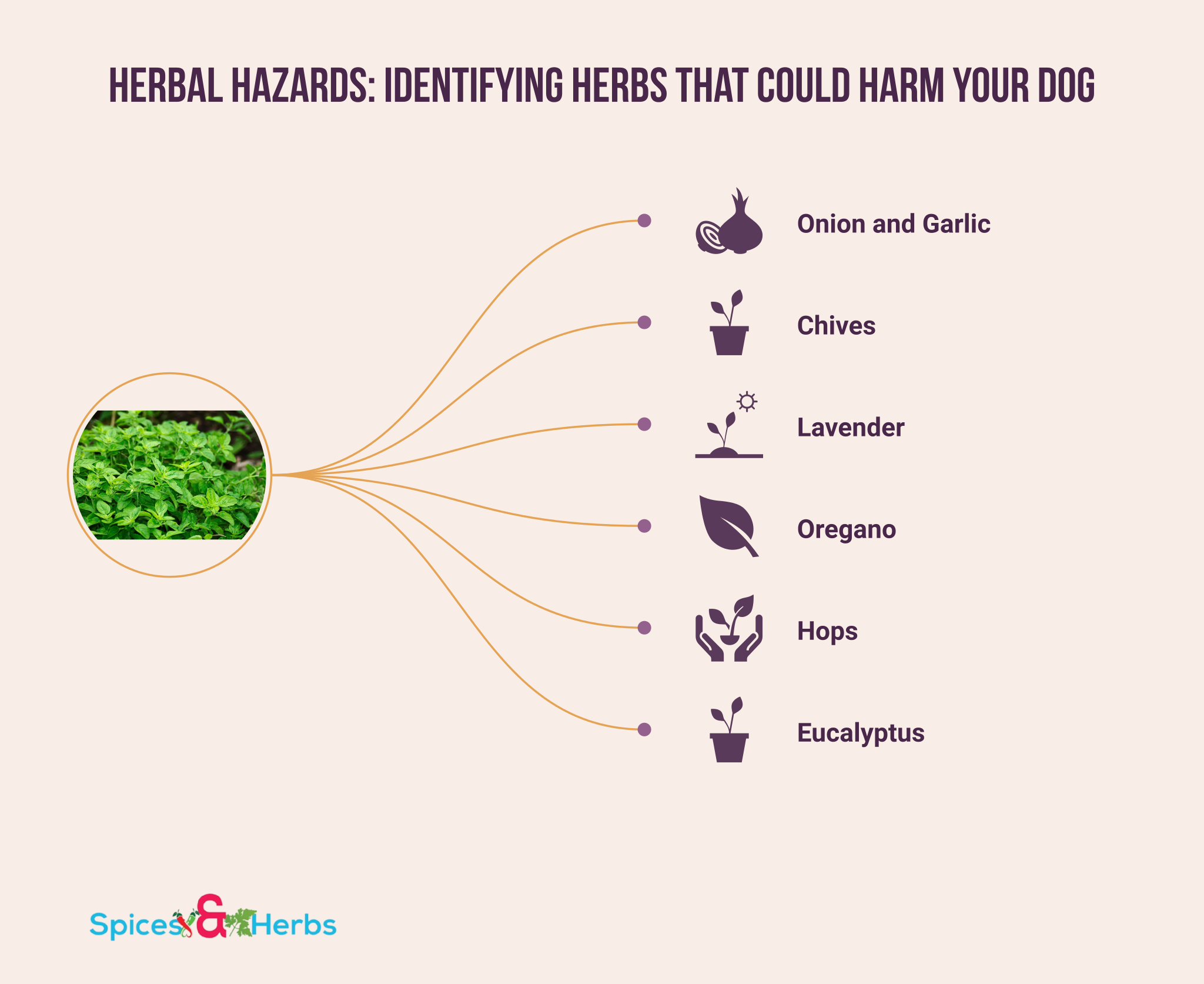
The good news is that most herbs are generally considered safe for dogs. The bad news is, there are some exceptions to this rule!
Here’s a list of common herbs that can be toxic to our furry friends:
🌿 Onion and Garlic
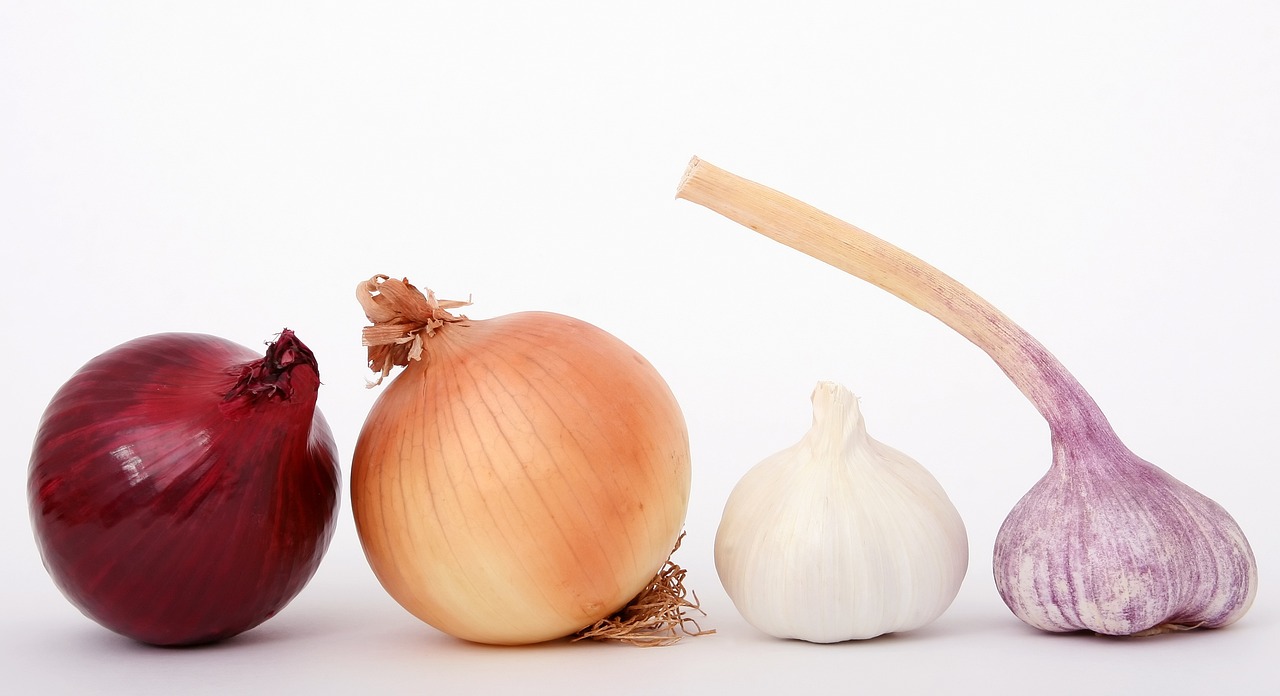 Onions and garlic are part of the Allium family, and while they’re a treat for our taste buds, they contain substances called thiosulfate. Now, you might be thinking, “thiosulfate-what?” Bear with me; it’s not as complicated as it sounds.
Onions and garlic are part of the Allium family, and while they’re a treat for our taste buds, they contain substances called thiosulfate. Now, you might be thinking, “thiosulfate-what?” Bear with me; it’s not as complicated as it sounds.
These compounds, when ingested by dogs, can cause damage to their red blood cells, leading to a condition known as hemolytic anemia. This can result in symptoms like weakness, breathlessness, and lethargy in your furry friend.
And here’s another thing – it doesn’t matter if the onions or garlic are cooked, raw, or even in powdered form; they’re still harmful. So, the next time you’re cooking up a storm in the kitchen and your pup gives you those irresistible puppy eyes, remember, sharing isn’t always caring – at least when it comes to onions and garlic!
🌿 Chives
 Take Japanese breeds like the Shiba Inu, for example. These adorable fluff balls have a heightened sensitivity to chives compared to other breeds. So, if you’re lucky enough to share your home with one of these charming pups, you’ll want to be extra diligent about keeping them away from chives.
Take Japanese breeds like the Shiba Inu, for example. These adorable fluff balls have a heightened sensitivity to chives compared to other breeds. So, if you’re lucky enough to share your home with one of these charming pups, you’ll want to be extra diligent about keeping them away from chives.
And here’s something else to remember: sometimes chives can sneak their way into places you’d least expect them, like dog treats. Shocking, right? That’s why reading the ingredient list on your dog’s treats is important before giving them a tasty reward.
Just a quick scan of the package can help ensure you’re not inadvertently giving your beloved pet something that could harm them.
🌿 Lavender
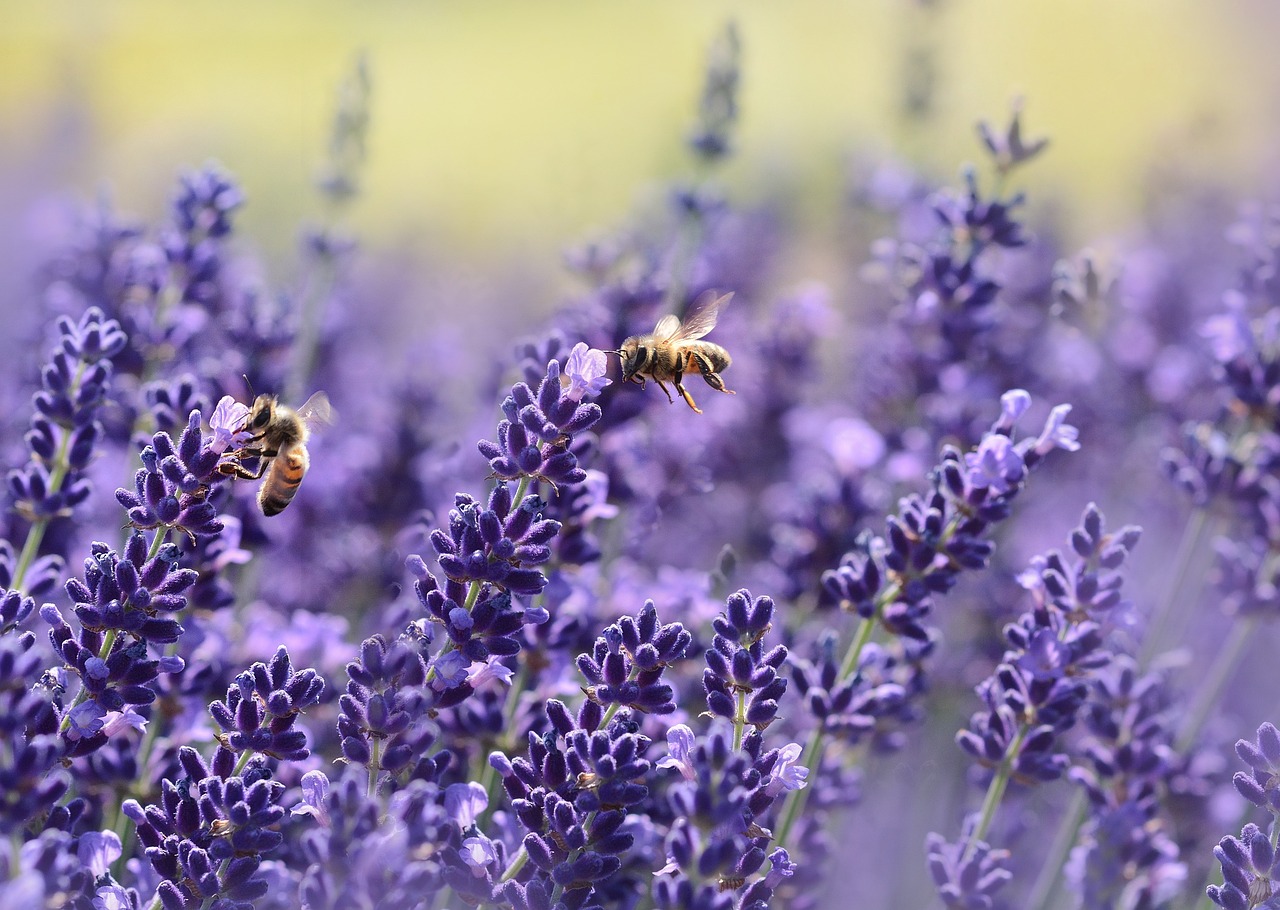 We love lavender for its calming scent and often use it in essential oils, lotions, and even teas. But this purple beauty is not as benign as it seems when it comes to our furry friends.
We love lavender for its calming scent and often use it in essential oils, lotions, and even teas. But this purple beauty is not as benign as it seems when it comes to our furry friends.
Lavender contains a compound called linalool. While linalool is what gives lavender its distinctive, soothing aroma, it can be toxic to dogs if consumed. And it’s not just the plant itself we need to be wary of. An essential oil containing lavender can also pose a risk to our puppies.
Remember how we love to unwind with a little lavender oil in our diffusers? If your dog accidentally ingests this oil, it could lead to serious health issues. Symptoms can range from vomiting and diarrhea to severe signs like difficulty walking or breathing.
🌿 Oregano
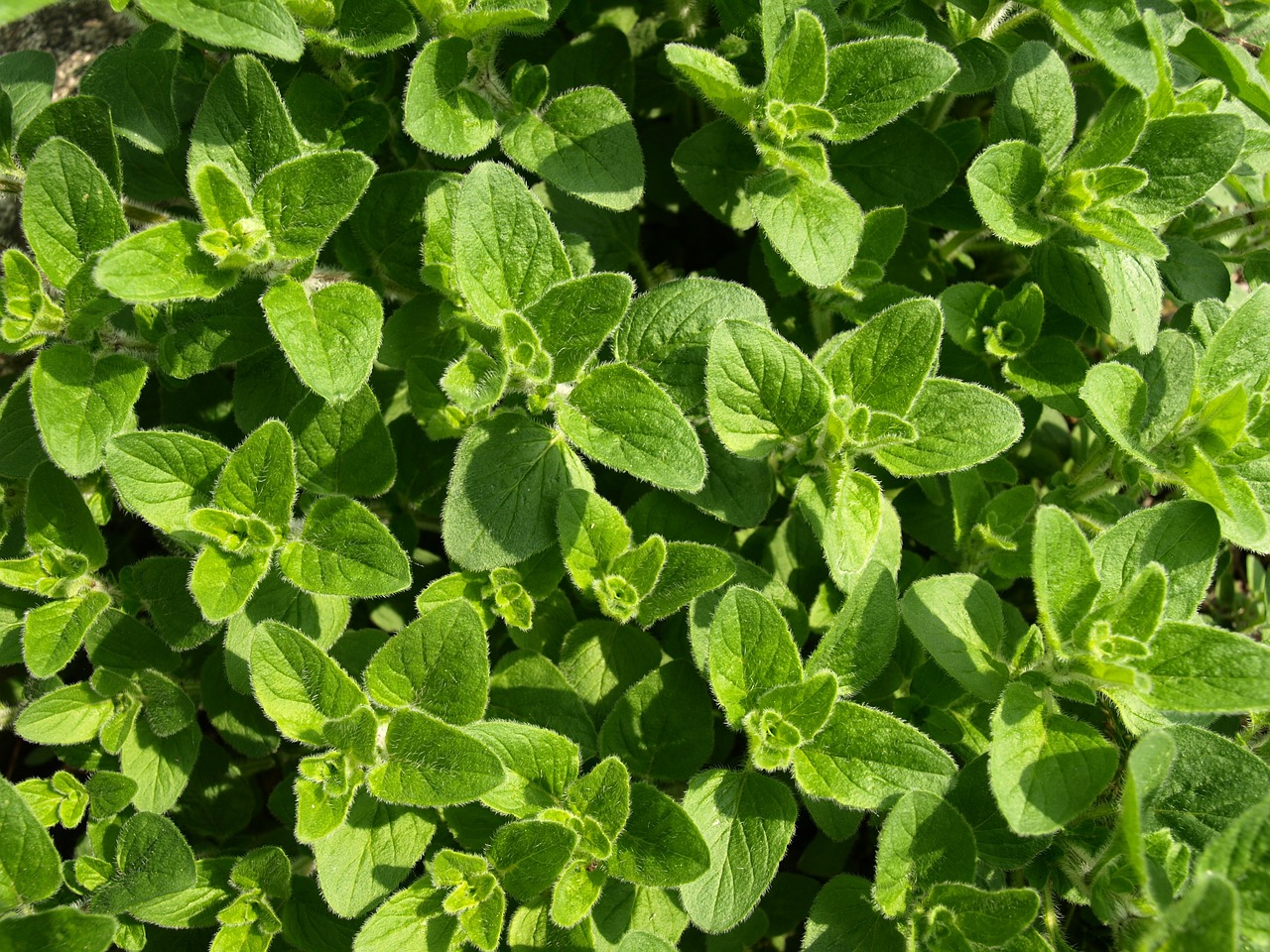
This herb is a fantastic addition to pizza, pasta, and a host of other dishes, giving them a unique flavor that’s hard to resist. But when it comes to our furry friends, we need to exercise caution.
Oregano itself isn’t necessarily a no-go for dogs. In fact, in very small quantities, it’s generally safe for dogs to ingest. However, it’s a different story when we’re talking about the oil of oregano or large amount of the herb. These can be toxic to dogs and cause some serious gastrointestinal issues.
Imagine your dog having tummy troubles like diarrhea, vomiting, or even abdominal pain. Not a pretty sight, right? That’s exactly what can happen if your pup gets into a substantial amount of oregano or its oil.
🌿 Hops
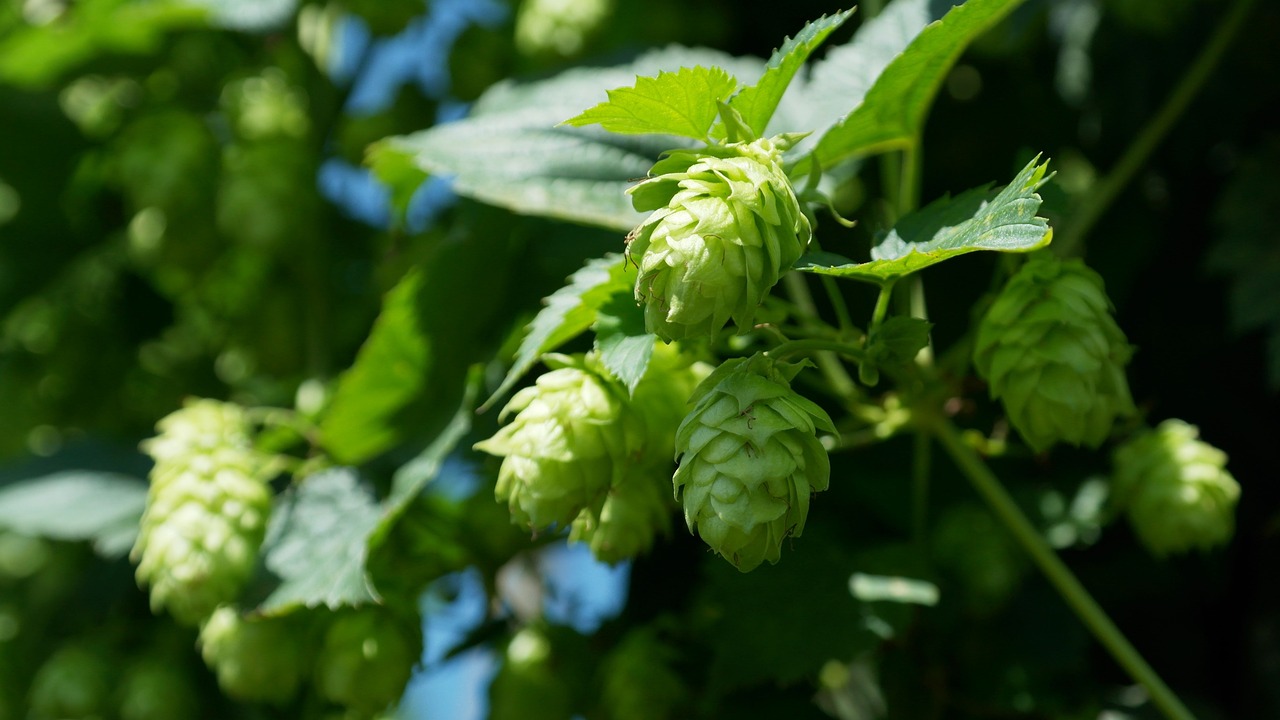 Hops are what give beer its bitter taste and enticing aroma. You see, hops can be incredibly dangerous to dogs. If ingested, they can cause a severe condition known as malignant hyperthermia. This is a fancy term for an extremely high body temperature that can quickly become life-threatening.
Hops are what give beer its bitter taste and enticing aroma. You see, hops can be incredibly dangerous to dogs. If ingested, they can cause a severe condition known as malignant hyperthermia. This is a fancy term for an extremely high body temperature that can quickly become life-threatening.
It’s not just one form of hops that’s harmful, either. Whether dried, fresh herb, or even cooked into a meal, all hops pose a risk to our canine companions. And considering how large these plants can grow, they’re pretty hard to miss in a garden or yard.
So, if you’re a home brewer or just happen to have some hops lying around, keep them well out of your pup’s reach. After all, while we might enjoy the hop plant’s fruits (or rather, brews), they’re more bitter than sweet for our dogs diet.
🌿 Eucalyptus
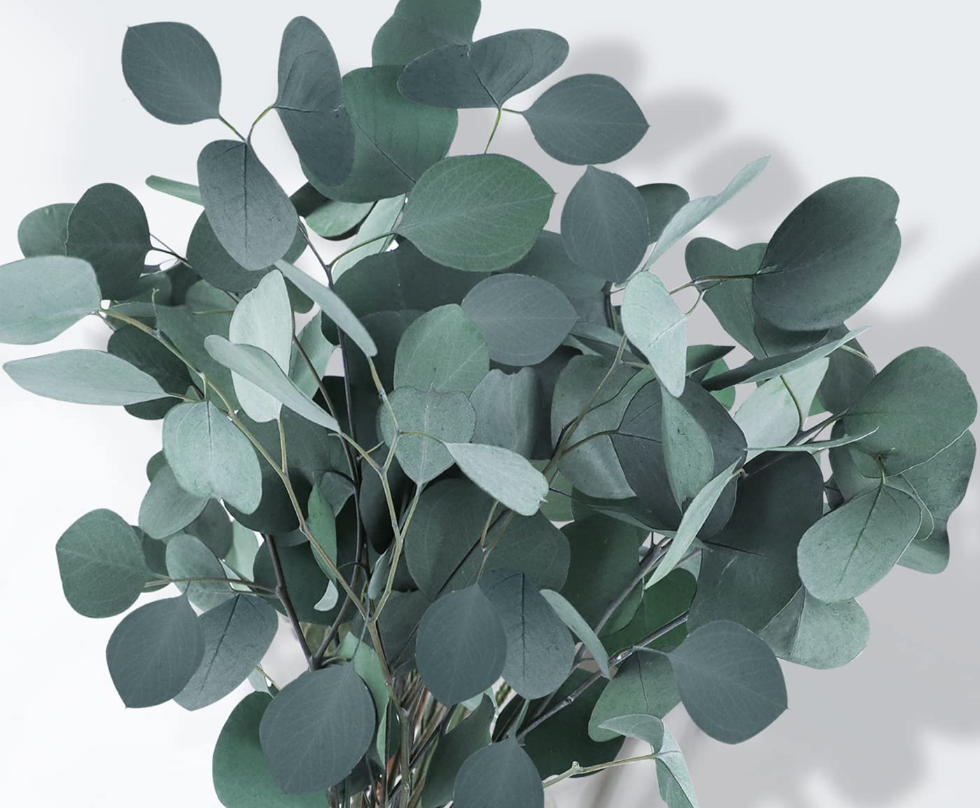
Known for its refreshing scent and often used in aromatherapy, eucalyptus might seem like a harmless addition to your home or garden. But this plant is more foe than friend when it comes to our furry friends.
The problem lies in a compound found in eucalyptus called eucalyptol. While eucalyptol gives eucalyptus its distinctive smell, it can be very dangerous to dogs if ingested. It’s a gastrointestinal irritant that can cause digestive upset in your dog’s stomach and cause symptoms like vomiting, diarrhea, and a generally upset tummy.
Signs and Symptoms of Herb Toxicity in Dogs
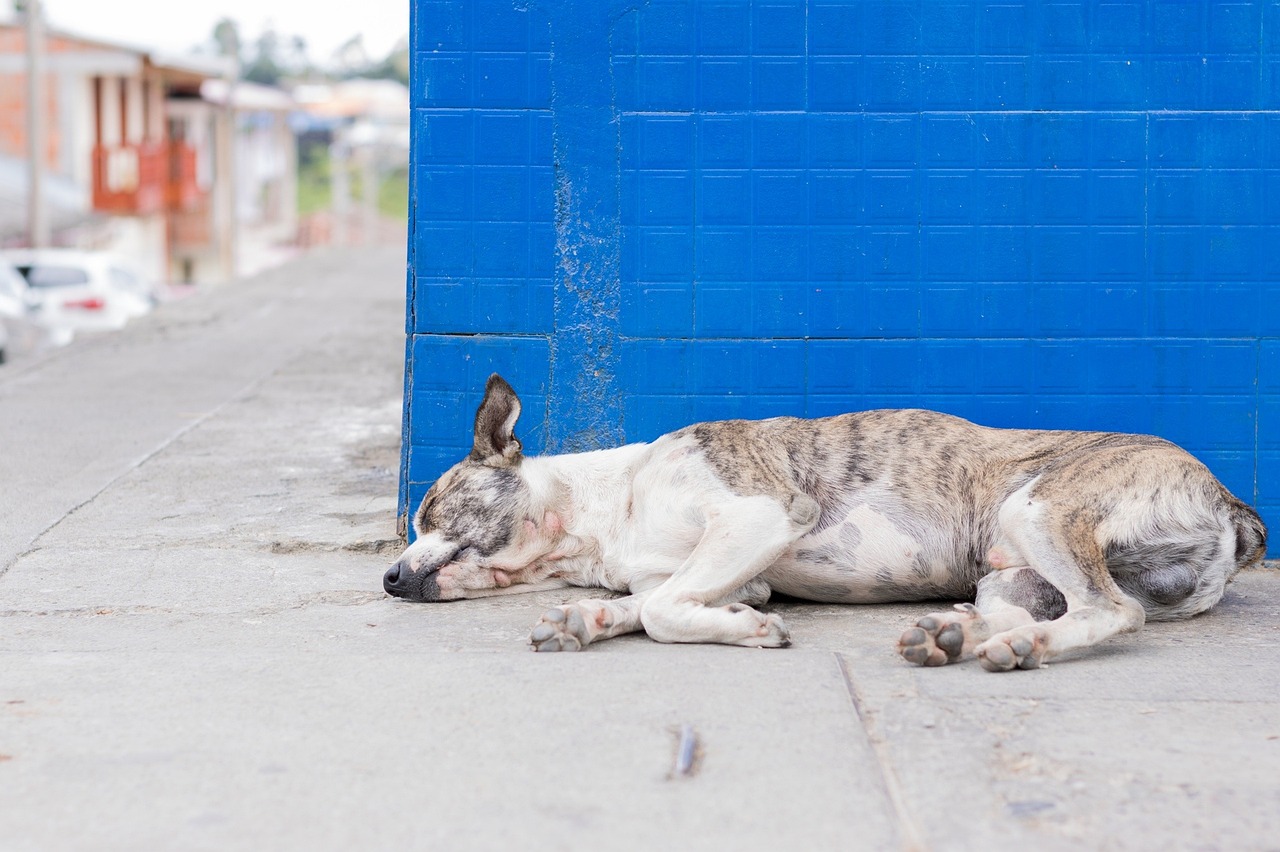
If your dog has ingested a toxic herb, you might notice them vomiting or having diarrhea. These clearly indicate that something isn’t sitting right in their tummy. Also, keep an eye out for changes in their urine color, as this can sometimes be a telltale sign of toxicity.
We all know our dogs’ typical behavior – how they act when they’re happy, hungry, or just want some attention. Any significant change in this behavior, such as sudden lethargy, depression, or weakness, could indicate herb toxicity.
The severity of these symptoms can vary depending on the type of herb and the amount ingested. For instance, while a small amount of oregano might cause mild discomfort, ingesting a large quantity of a more toxic herb, like hops, could lead to life-threatening conditions.
What to Do If Your Dog Consumes a Toxic Herb
If your fur baby gets into a toxic herb, here are the steps you should follow:
- Stay Calm: I know it’s easier said than done but remember, our pups can pick up on our emotions. Staying calm will help keep them calm too.
- Remove Your Dog from the Area: Try to get your dog away from the toxic plant to prevent them from ingesting any more of it.
- Gather Information: Identify the plant or herb and estimate how much your dog might have eaten. This info is going to be crucial for your vet.
- Call the Vet or a Pet Poison Helpline Immediately: Don’t wait to see if symptoms appear. The quicker your pet gets professional help, the better their chances.
- Follow Professional Advice: Your vet may give you specific instructions based on the type of plant ingested. Only induce vomiting if specifically instructed to do so.
- Monitor Your Pet: Keep a close eye on your dog for any changes in behavior or physical condition. Report these to your vet.
Preventing Herb Toxicity in Dogs
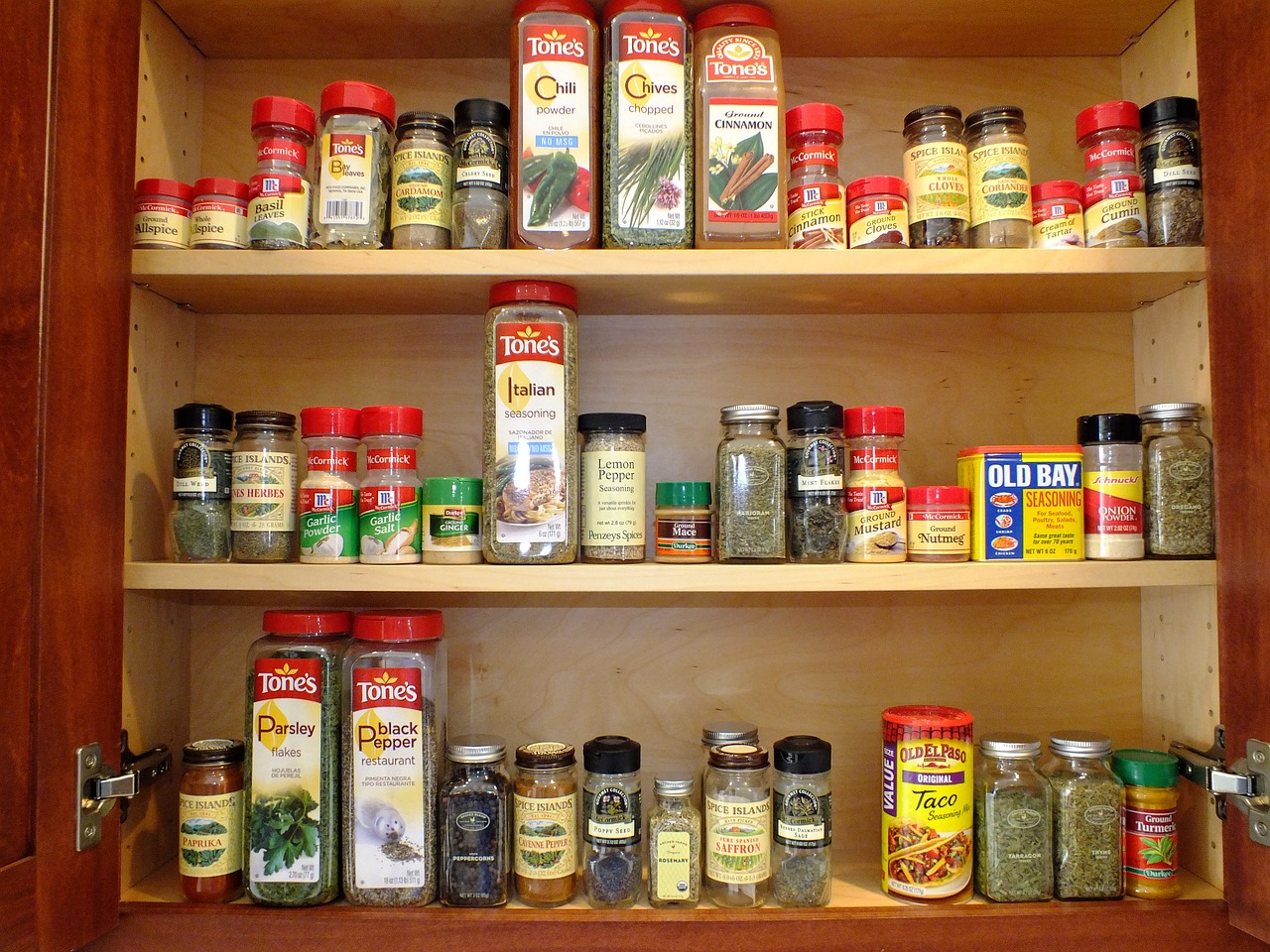
As a responsible pet parent, it’s your job to keep your pup safe. And that means ensuring they don’t get into trouble – especially when it comes to potentially toxic plants or herbs.
If you want to avoid herb toxicity in dogs, here are some steps you can take:
✅ Safe Storage and Handling of Herbs
We all want to keep our dogs safe, right? So when it comes to herbs, practicing safe storage and handling is essential. Keep potentially toxic herbs out of reach of your furry friends. If you’re using them in the kitchen, make sure they’re stored in a secure cupboard or high shelf your dog can’t access.
And remember, when you’re cooking or preparing meals, keep an eye on any stray leaves or stems that might fall onto the floor.
✅ Training Your Dog to Avoid Certain Plants
Training is another powerful tool in preventing herb toxicity. Start by teaching your dog the “leave it” command. This can come in handy if they start sniffing around something they shouldn’t. Consistent training can help your dog understand that not everything within its reach is meant for munching.
✅ Creating a Dog-Safe Garden
If you love gardening and have a variety of plants and herbs, consider creating separate areas for those that are safe and those that aren’t. You might even consider a fence or barrier around toxic plants. This way, you can let your dog roam freely in the garden without constant worry.
✅ Know Your Plants
Finally, knowledge truly is power. The more you know about which plants are toxic to dogs, the better you can protect them. There are many resources available online to help identify potentially harmful herbs and plants.
Remember, our dogs rely on us to keep them safe. By practicing safe storage, consistent training, and informed gardening, we can help prevent herb toxicity and ensure our pups stay happy and healthy. After all, there’s nothing better than seeing our four-legged friends wagging their tails in joy!
Frequently Asked Questions
Q: What herbs are safe for dogs?
Basil, for example, not only adds a delicious flavor to dishes but also has anti-inflammatory properties that can help soothe achy joints in dogs. Turmeric is another herb that has become increasingly popular in recent years due to its anti-inflammatory and antioxidant properties. And let’s not forget about curly parsley! This herb is packed with vitamins A and C and can even freshen up your dog’s breath.
Q: Can excessive drooling in my dog indicate herb toxicity?
Yes, excessive drooling can be a symptom of herb toxicity. If your pup is drooling more than usual, it could be a sign that they’ve ingested something toxic. Other signs of toxicity include upset stomach, skin irritation, vomiting, and diarrhea. Contact your vet immediately if you suspect your dog has ingested a toxic herb or plant.
Q: What kind of dog food should I avoid if my dog is prone to herb toxicity?
If your pup tends to have herb toxicity, you should avoid any food that contains potentially harmful herbs or plants. This includes foods with ingredients like mint, garlic, hops, and chamomile. Additionally, you should be sure to check the label of any food you buy for your pup and be sure it doesn’t contain any herbs or plants that could be toxic.
Q: What can I do if my dog is experiencing gastrointestinal distress after consuming a toxic herb?
If your dog is experiencing gastrointestinal distress, the first thing you should do is contact your vet. They can guide how to treat your pup best. Depending on the type of herb ingested, they may recommend inducing vomiting or providing supportive care. It’s also important to monitor your pup for any changes in behavior or physical condition and report these to your vet. This information is important in helping them determine the best course of action.
Q: Is cocoa powder toxic for dogs?
Yes, cocoa powder is extremely toxic for dogs and should be avoided at all costs. Ingestion of this substance can cause seizures, muscle tremors, elevated heart rate, and even death. If you suspect your pup has consumed cocoa powder or any other toxic substance, seek medical attention immediately. Keeping our pups safe is one of the most important parts of being a pet owner, so always be aware and take the necessary precautions. And remember – prevention is better than cure!
Final Words
As a dog owner, I know how important it is to keep our furry friends safe from harm. And after researching toxic herbs for dogs, it’s become even clearer to me just how easy it is for our canine companions to get sick. But don’t worry; knowledge is power, and now that we know what to avoid, we can take proactive steps to protect our beloved pets. From onions to garlic, the list of dangers may seem daunting, but by educating ourselves, we can ensure our pups lead happy and healthy lives. So, let’s be vigilant and keep our furry friends out of harm’s way. After all, our dogs give us unwavering loyalty and love; it’s only fitting that we do the same for them.

